It’s often been said about careers that you should “find something that you love to do and you’ll never work a day in your life.” This maxim could not ring truer for anyone in the green industry than it does for Brent Mecham, CID, CLWM, CIC, CLIA, CAIS.
Once he found irrigation, he never looked back. And 45 years later he’s still at it, conducting experiments, advocating for the industry and passing along his wisdom everywhere he goes. It still doesn’t feel like work to him. He’s made friends all over the country and in his own words “gets paid to play.” Oh, and he’s also pretty good at it too.
Mecham has built an entire career out of his love of landscaping and irrigation. His passion and enthusiasm for the technology is so evident that the Irrigation Association decided to make him a full-time employee. After more than 10 years as the IA’s industry development director, he’s still teaching people how to irrigate and continues to take on even newer ventures with the association.
His “little niche”
Mecham was introduced to the science of growing plants early on in his life, working in his family’s large garden in Fort Collins, Colorado. Teaching is in his genes too; his father taught the Future Farmers of America program at the local high school.
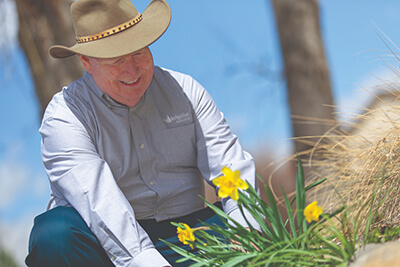 Many a morning was spent pulling weeds before the sun got too warm — though he admits this wasn’t his favorite chore. A paper route provided his first foray into landscaping. Some of the homeowners he delivered to also hired him to mow their lawns. He could be seen pushing his father’s mower around the neighborhood or pulling it behind his bike in hopes of picking up jobs.
Many a morning was spent pulling weeds before the sun got too warm — though he admits this wasn’t his favorite chore. A paper route provided his first foray into landscaping. Some of the homeowners he delivered to also hired him to mow their lawns. He could be seen pushing his father’s mower around the neighborhood or pulling it behind his bike in hopes of picking up jobs.
“That’s not that unusual of a story,” Mecham says. “I think many guys in this industry did exactly the same thing, and I am no different,” he says. That may be true, but the decision to make the green industry his career came to him in quite an uncommon place: South America. While winding down a two-year mission stint in Peru for his church, he pored over college course catalogs trying to decide on a major.
“I was looking over all the different categories of majors and scratching through the ones I had little or no interest in,” he says. The process took several weeks. He thought about engineering but wasn’t sure he had the math chops. “As I went through the course listings, I honed in on landscape horticulture.”
Colorado State University had a terrific horticulture program, and he figured he could save money by living at home with his parents while he was in school.
“So I came home from my mission and re-enrolled in CSU.”
When he told people what he planned on doing, many were “a bit dubious” about it. He understands why; it was a bit different from the business marketing major he’d pursued before he left, but “it was really what I wanted to do.”
He went for it and found that he excelled at it. “I took my first few classes and did pretty well. Pretty soon I had a job within the department and made the dean’s list a couple times.”
Mecham says at that point, he knew that he’d “found his little niche.”
Hooked on irrigation
With his Bachelor of Science degree in landscape horticulture design in hand, Mecham landed his first post-college job at Greek Gardens, a nursery and landscaping company in Logan, Utah. There, he quickly became “the guy who could do irrigation.”
“The first jobs I ended up doing involved repairing irrigation systems,” he says. “And these were systems that were made out of galvanized pipe.” He seemed to really have an aptitude for it, so before long his boss gave him another irrigation-related task, this time, working on a large hydraulic system.
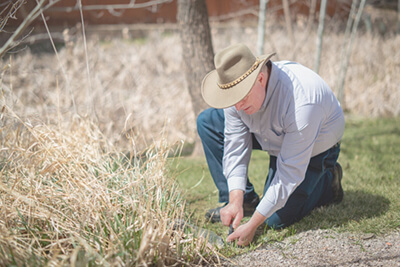 He was responsible for caring for and maintaining the system. He was given that big responsibility because he was, in his words, “able to figure it out.”
He was responsible for caring for and maintaining the system. He was given that big responsibility because he was, in his words, “able to figure it out.”
He eventually left Utah and went back to Colorado, taking a job with another landscaping company in Loveland, but there weren’t a lot of opportunities to do irrigation work. “All we did was the landscaping, and we always had to work with an irrigation company to do the installations.”
One fall, it all changed. The company he worked for was trying to finish up a job before winter hit, but the irrigation company was so backed up that it wasn’t going to get to the project in time. Mecham was able to draw on his past experiences and help the landscape company do the installation itself.
“I worked with a local distributor,” he says. “A man named George Arnold became my mentor, helping me design the system, figure out the parts and how they all fit together. We installed that first irrigation system and were able to complete the landscaping too. That’s when I got hooked.”
Not only was he good at irrigation work, he liked doing it. He even got to use a little of the engineering skills he hadn’t thought he was smart enough for in planning out the hydraulics and piping. His next step was to take his knowledge of irrigation a step further.
Mecham enrolled in a program being offered at that time called the “Weathermatic College of Irrigation Knowledge,” a two-week boot camp at the Weathermatic facility in Dallas. For two weeks, irrigation design was taught. There, he was introduced to the Turf Irrigation Manual, a renowned source of information for irrigation contractors.
“I really learned a whole lot about irrigation design,” Mecham says. He recalls that back in those days a scientific calculator was a must-have because all the calculations were done manually using the Hazen-Williams formula, and “we didn’t have charts to look at.”
He installed several systems for Loveland Landscaping before ultimately deciding, in 1985, to start his own landscape and irrigation company, Trademark Landscapes. It was then that he figured out, “I was average at landscaping and way better than average at the irrigation part of it.”
Trademark focused on building complicated irrigation systems. Soon it became one of the preferred bidders for installation jobs. He worked with quality designers and consultants. “I learned a lot from them in the process of building these systems. As a contractor, I got to see both sides of it, understanding the plans and executing them well in the field. It was a great relationship.”
Mecham was making a name for himself in landscape irrigation circles, and he was beginning to understand new technologies that were coming to market, ones that were even more complicated, such as central control systems. His reputation for having a deep understanding of irrigation led to him being hired by the Northern Colorado Conservancy District for what started out as a summer project.
Northern Water, as it is referred to now, at that time provided water to 32 municipalities and 120 ditch companies that supplied farmers.
The district needed Mecham’s background and knowledge of landscape horticulture. They had him collecting data on water use and nitrate leaching in urban landscapes. Within a year the district hired him full time, giving him a lot of latitude.
“I created my own position, my own title and my own program,” Mecham says. The real purpose of his role as landscape water management conservation specialist was to promote water conservation and water management in the urban landscape — and he loved it. This is when he first began telling people “I get paid to play.”
As he conducted various demonstrations and studies looking at different water-related issues, he would always see something in a landscape that he wanted to find an answer to or do in a better way.
Among the many programs Mecham helped set up during his 13 years with Northern Water are conservation gardens that demonstrate landscaping and irrigation techniques and the right way to apply water. Since that time, different people have come and gone at the agency, but those gardens are still in place and still being used for their original purpose and foundation.
“For me, that is a little bit of a source of pride in that these things I thought of are still having an impact all these many years later,” Mecham says.
Association ties
Mecham first got involved with the Irrigation Association in the early 1990s, when he still owned his own company. He took his first irrigation auditor certification class and became certified as a CLIA.
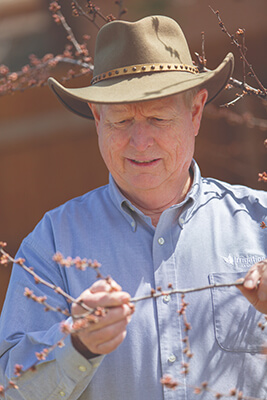 “That’s when I really got engaged in it and when I first learned about auditing,” he says. “That skill set helped me a lot when I worked for the Northern Colorado Conservancy District. I was pretty new in the area and worked with a lot of municipalities on the concept of water auditing,” he says. Many of the principles he brought to these municipalities were ones he’d learned in the auditor certification class.
“That’s when I really got engaged in it and when I first learned about auditing,” he says. “That skill set helped me a lot when I worked for the Northern Colorado Conservancy District. I was pretty new in the area and worked with a lot of municipalities on the concept of water auditing,” he says. Many of the principles he brought to these municipalities were ones he’d learned in the auditor certification class.
Mecham experienced firsthand the evolution of the IA education program, from teaching hundreds of classes a year to today, where far fewer classes are taught directly through the IA. “Part of its progression has been that companies like Rain Bird, Hunter and Toro, for example, have picked up our teaching materials as part of their educational programs,” he explains. “I think the vision from more than 20 years ago is beginning to be fulfilled.”
The teaching experience helped him learn how to educate adult learners. The methodologies that you use for people that are out of school but still want to learn are different from the ones you’d use to teach young people in a school setting, Mecham says.
“Adult learners like to learn in a logical sequence,” he explains. “They don’t like to jump around. They like to see how the whole picture comes together. Adult learners within our industry tend to be tactile learners. They like to see, hear and touch. They like to assemble something and put it together.”
More meaningful than learning how to teach adults, however, are the people Mecham has met along the way. “Teaching has created many friendships for me around the country and within the industry, the association and with other instructors. I still run into people who have taken classes from me somewhere along the way. It’s always good to have a positive experience and a great connection with people,” he says.
After 20 years, Mecham says his teaching is more limited now, and “so is my energy,” he jokes. He says that the IA’s growth over the years hasn’t stemmed from putting on more classes but that “the bigger growth opportunity is that we’ve made our manuals and classes available to the industry, community colleges or universities to use.”
Mecham adds that the classes teach skill sets that students can put to use right away. The cost might be higher than other courses out there, but there’s a reason for that. “We actually offer more value because we aren’t just giving them information, we’re giving them a skill,” Mecham says.
He recently attended the National Collegiate Landscape Competition on the campus of his alma mater and watched numerous teams compete in the irrigation section. “It was gratifying to see so many young people who have knowledge and skills that are better than what I had at their age,” he says.
Solidifying his commitment
Mecham came on with the IA as an employee in 2007, a year after Deborah Hamlin became the CEO. Hamlin had a vision for a industry development director. Mecham’s friend Stephen Smith, PhD, FASIC, CAIS, CLIA, who was on the IA Board of Directors at the time, sent him a note with a description of the job.
“He sent it to me with this idea that if I knew anybody that had these qualifications to forward that person’s information to him.”
Mecham knew someone all right. He read the job description over and thought he just might be the right person for the job. “Even though I was happy with what I was doing at the water agency, this was really intriguing — so at the last minute I did submit a resume, and before I knew it I had an interview and a job offer.”
It all happened rather quickly. Before he knew it, he was moving to Virginia to work in the IA’s Fairfax office. His role has definitely evolved since then.
“The vision of what the industry development director was to do then versus what I’m doing now has really morphed a lot,” says Mecham looking back. Originally, he was working with the certification, education and foundation areas of the IA. Then in 2010 the IA held a strategic planning session.
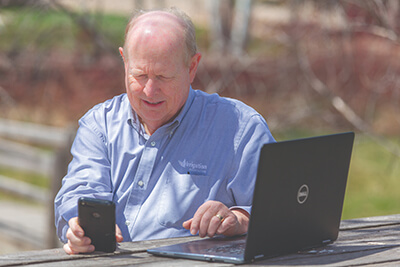 One conclusion from the session was that the IA should be involved in setting codes and standards. That was not Mecham’s area of expertise, but a few people on the board thought he was right for the endeavor. “I did get involved in the codes and standards, and I haven’t been able to get out of it since,” he jokes.
One conclusion from the session was that the IA should be involved in setting codes and standards. That was not Mecham’s area of expertise, but a few people on the board thought he was right for the endeavor. “I did get involved in the codes and standards, and I haven’t been able to get out of it since,” he jokes.
He says the codes and standards side of the irrigation marketplace has “really exploded” due to the growth of interest in green building and sustainability. “Water use is a huge part of that discussion, and irrigation uses a lot of water,” he says. “Because of that we are always a focus of attention from groups outside of our industry.”
Taking on codes and standards made Mecham realize not everyone understands irrigation or they may have incorrect assumptions. Some even want to ban it altogether. “Part of what I do with codes and standards is training and education, helping people who don’t know and understand plants and water to ultimately become knowledgeable and have the power to make informed decisions and bring some middle ground to the discussion,” he explains.
It would be nice if the irrigation industry could just be left alone, he says, but of course that is not going to happen. Better to be prepared for it. “The companies I see in the landscape world who are embracing the concept of sustainability and are actually implementing that in their practices and business philosophies are going to be the companies that will succeed in the future,” he predicts. “We cannot function at the status quo of 10 or 15 years ago. Now, it’s all about sustainability, and as the original “green” industry, we need to become very green in how we use resources.”
Irrigation is not going to go away, Mecham says, and it’s up to the industry to help increase the public’s understanding of it. “Despite regulations, it’s hard to get people to do the right thing,” he says. “We are a great user of a precious resource, so we as an industry need to be able to embrace that and be articulate about it.”
Mecham says he is fortunate in his career to have made connections with “lots of very skilled, talented and committed people” in what is still just a small industry.
“My life is blessed because I have made so many friends this way, and the Irrigation Association has enabled that for me.”
His tenure with the association has also allowed him to spend time with manufacturers. He says many people don’t realize the amount of money these companies invest in research and development in an effort to make better products. And while he concedes that the products of 25 years ago could still get the job done, he sees technology as part of the answer to solving the industry’s current problems, like not having enough people to do the work.
Mecham has had a long run in the irrigation industry and it’s not over yet. He jokes that the reason he’s stayed in it so long is that, “I’m not smart enough to do anything else.” But the real reason is, “I really love what I do and I’ve truly enjoyed it. It has blessed my family and my life.”
He says he started out like everybody else, “working in the trenches,” but all the time taking advantage of the opportunities that came along. He likes to say, “Education is expensive, and the college of hard knocks has the most expensive tuition of all.”
Coming full circle
If Mecham had it to do all over again, he’d follow the same path. And that path is now turning in a circle. A few months ago, he and his wife Nina moved back to Colorado where it all started, in more ways than one. He’ll still be working for the IA but setting up an office at the recently launched Irrigation Innovation Consortium on property owned by Colorado State University.
This public/private initiative is a collaborative research effort to accelerate the development and adoption of waterefficient irrigation technologies and practices. Mecham will work with professors at CSU and four other universities as well as leading irrigation industry companies.
“The Consortium is about exploring new and innovative ideas and products that can be used for irrigation in both agriculture and urban settings. And so I’m going to take all this knowledge and experience that I’ve gained working for the water agency, working as a contractor and working with the IA to be a voice for the irrigation industry within the Consortium.”
The IIC could be an incubator for new ideas to be tested and validated and brought to market, Mecham says. It will also be involved in training and technology transfer.
Part of the move back to Colorado means cutting back his hours, but his involvement in the Consortium is sure to take up a lot of his time. He is still full of ideas he wants to test out and is happy to “have a playground again” and to “get paid to play in it.”
Mecham says irrigation is a young man’s industry because it is so physically demanding, and now that he’s 69, he’s happy to help pass the torch. “I am at the point in my career where the best thing I can do is help others become very successful, and I enjoy doing that.” We have no doubt he will continue to leave a lasting impression on future generations of irrigators.
This column originally appeared in Irrigation & Green Industry magazine.
Kristin Ely is editor-in-chief of Irrigation & Green Industry magazine and can be reached at kristinsmithely@gmail.com.

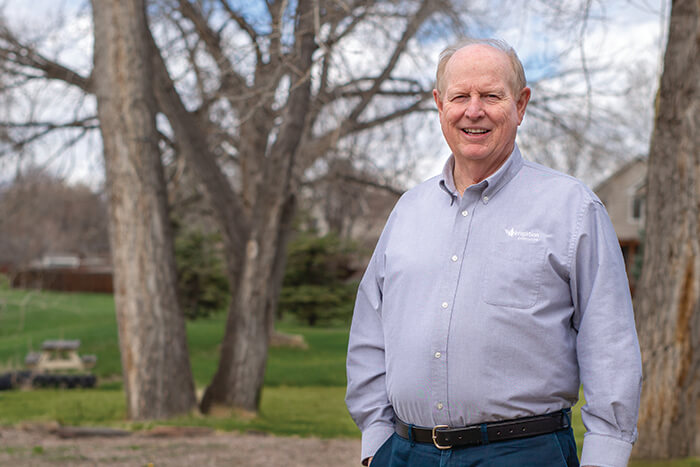
 Many a morning was spent pulling weeds before the sun got too warm — though he admits this wasn’t his favorite chore. A paper route provided his first foray into landscaping. Some of the homeowners he delivered to also hired him to mow their lawns. He could be seen pushing his father’s mower around the neighborhood or pulling it behind his bike in hopes of picking up jobs.
Many a morning was spent pulling weeds before the sun got too warm — though he admits this wasn’t his favorite chore. A paper route provided his first foray into landscaping. Some of the homeowners he delivered to also hired him to mow their lawns. He could be seen pushing his father’s mower around the neighborhood or pulling it behind his bike in hopes of picking up jobs. He was responsible for caring for and maintaining the system. He was given that big responsibility because he was, in his words, “able to figure it out.”
He was responsible for caring for and maintaining the system. He was given that big responsibility because he was, in his words, “able to figure it out.” “That’s when I really got engaged in it and when I first learned about auditing,” he says. “That skill set helped me a lot when I worked for the Northern Colorado Conservancy District. I was pretty new in the area and worked with a lot of municipalities on the concept of water auditing,” he says. Many of the principles he brought to these municipalities were ones he’d learned in the auditor certification class.
“That’s when I really got engaged in it and when I first learned about auditing,” he says. “That skill set helped me a lot when I worked for the Northern Colorado Conservancy District. I was pretty new in the area and worked with a lot of municipalities on the concept of water auditing,” he says. Many of the principles he brought to these municipalities were ones he’d learned in the auditor certification class. One conclusion from the session was that the IA should be involved in setting codes and standards. That was not Mecham’s area of expertise, but a few people on the board thought he was right for the endeavor. “I did get involved in the codes and standards, and I haven’t been able to get out of it since,” he jokes.
One conclusion from the session was that the IA should be involved in setting codes and standards. That was not Mecham’s area of expertise, but a few people on the board thought he was right for the endeavor. “I did get involved in the codes and standards, and I haven’t been able to get out of it since,” he jokes.


